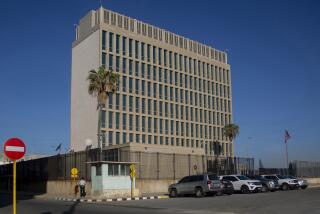No Disease Link Seen in Agent Orange Tests
- Share via
Air Force veterans who were exposed to Agent Orange for a year during the Vietnam War have so far suffered no unusual health problems, according to the most recent tests from a 20-year study of servicemen exposed to the herbicide.
The ongoing study, one of the most comprehensive done on the effects of Agent Orange, has so far shown that there is no link between increased levels of disease and exposure to the chemical, which was used to defoliate dense jungle areas.
“This is the definitive study on Agent Orange in Vietnam veterans, and so far it shows that disease is not related to apparent exposure, that there is no increased incidence of major long-term health effects. These results are reassuring,” said Air Force Col. William Wolfe, head of the epidemiology division at the Air Force’s School of Aerospace Medicine at Brooks Air Force Base in San Antonio. Wolfe is the study’s senior project investigator.
Though the Air Force is in charge of conducting the study, the Scripps Clinic and Research Foundation for the past four years has done the actual testing as part of an $11.5-million subcontract.
Findings Bolstered
The results of this latest round of examinations continue to bolster the study’s previous findings that there is no connection thus far between Agent Orange exposure and a higher incidence of disease, according to Dr. David Williams, the clinic’s medical director of the Preventive Medicine Center and the project director for the Air Force study.
Despite the latest results, those involved in the study caution that the findings are not conclusive. That’s because until two years ago, there wasn’t a test available that could measure serum dioxin levels in the blood. Such a test is now being given to the men involved in the study, and the results may be available as early as next year, Williams said.
Until now, he explained, the lack of such a blood test fueled the harshest criticism of the Agent Orange study. Williams said that given the results of the first three phases of the study, he expects the results of the blood tests to further confirm the previous findings.
Even if the servicemen are found to have high levels of dioxin in their systems, without some manifestation of disease, such a result would simply “lend further scientific credibility to the study,” Williams said.
At the center of the ongoing study are 1,016 Air Force veterans who were involved in Operation Ranch Hand, as the defoliation effort was called. The men were selected for the study because most of them were exposed to Agent Orange for up to 12 hours a day, five to six days a week, for at least one year. They were, according to the Air Force, the most heavily exposed servicemen.
But again, because until relatively recently there has been no method to test for dioxins in the blood, the study has had to rely on estimated levels of exposure.
The exposed veterans have been compared to 1,293 Air Force Vietnam veterans who were not involved in Operation Ranch Hand.
The two groups were tested at the Scripps Clinic and assessed for general health and malignancy, and checks were done on their neurological, gastrointestinal, dermatological, cardiovascular, hematological, renal, endocrine, immunological, pulmonary and nervous systems. Psychological testing was also done.
“We found no significant differences,” Williams said. Though some minor medical differences were seen, they appear unrelated to dioxin exposure and have disappeared over time.
Besides the results of the new blood tests, studies of the veterans’ mortality and birth defects in their families will also be completed in the next two years. The entire 20-year study is due to end in 2002.






